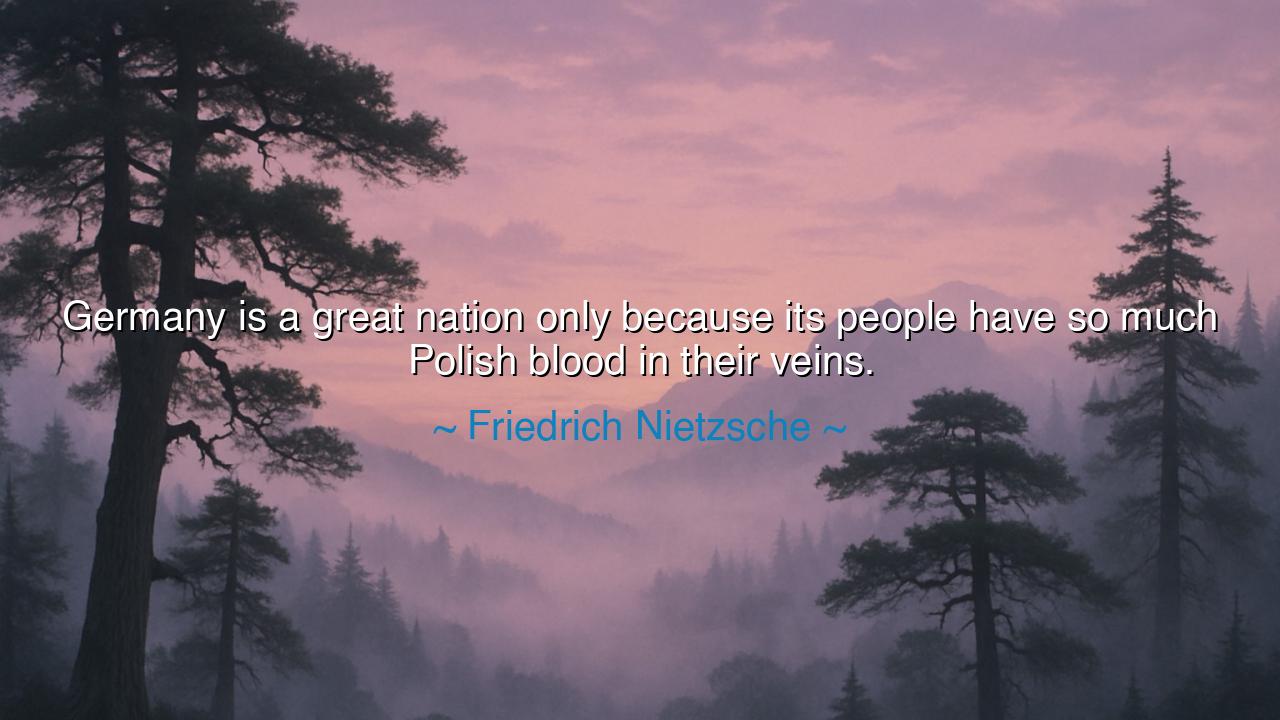
Germany is a great nation only because its people have so much
Germany is a great nation only because its people have so much Polish blood in their veins.






In this fierce and paradoxical reflection, Friedrich Nietzsche, the philosopher of fire and thunder, unveils a truth that pierces through the illusions of nationalism: “Germany is a great nation only because its people have so much Polish blood in their veins.” These words, born from his restless intellect and proud awareness of his own Polish ancestry, strike both as an irony and a revelation. Nietzsche, who despised blind patriotism and tribal arrogance, spoke here not merely of race or lineage, but of the intermingling of cultures — the fusion of spirit that gives rise to true vitality. To him, greatness was never the child of purity, but of diversity, struggle, and mixture.
The meaning of this quote lies far beyond mere pride or provocation. Nietzsche saw that nations, like individuals, grow strong not through isolation but through encounter and exchange. A people closed within itself becomes stagnant; it repeats, it decays. But a people touched by the blood, ideas, and passions of others becomes renewed, fertile, alive. In saying that German greatness came from Polish blood, Nietzsche meant that cross-pollination — of temperaments, of traditions, of instincts — is the source of creativity. The German mind, he suggested, owed its vigor not to racial superiority, but to the chaotic vitality and passion inherited from the Slavic soul. Thus, he overturned the pride of his age — he declared that mixture, not purity, is the mother of greatness.
The origin of this statement can be traced both to Nietzsche’s heritage and to his rebellion against the rising tide of German nationalism in the late nineteenth century. He was born into a culture intoxicated by the myth of the “pure German race,” yet he despised such narrowness. Nietzsche, proud of his claimed Polish ancestry through his noble forebears, often used this heritage to challenge the arrogance of his countrymen. But his point was not genealogical — it was philosophical. He saw that nations obsessed with purity were destined for decline, for they turned inward, rejecting the very chaos that gives rise to genius. For Nietzsche, the interplay of opposites — order and passion, logic and instinct, Apollonian calm and Dionysian fire — was the secret of creation itself.
History itself bears witness to the truth of Nietzsche’s words. Consider the Renaissance, that golden rebirth of art and intellect. It did not bloom in isolation but through the blending of ancient Greek ideals, Arabic science, Italian passion, and northern precision. Or look to America, a nation forged not from one people but from many — its vitality drawn from the fusion of languages, customs, and dreams. The strength of civilizations lies not in their boundaries, but in their bridges. Every empire that has risen — from Rome to Byzantium — drew power from absorption, from mingling with those it conquered or embraced. And every empire that fell, fell because it forgot this law, mistaking purity for strength and isolation for virtue.
Nietzsche’s insight can also be seen in the lives of individuals. The great mind, like the great nation, is never singular. It contains multitudes — contradictions, influences, opposing forces in dialogue. The thinker who reads only one tradition, the artist who clings to one school, the leader who listens to only one voice — all are diminished by their narrowness. Greatness demands complexity, the courage to be shaped by what is foreign, to let the unfamiliar challenge and transform you. Nietzsche himself was such a man — a philosopher who absorbed the wisdom of Greece, the art of Italy, the fire of the East, and the reason of the West. He was, as he once said, a “good European” — a man beyond borders.
The lesson of this quote, then, is one of humility and openness: greatness is born from mixture, not from pride. We must not fear the foreign, but embrace it; not guard our blood or our ideas as treasures, but share them as gifts. In the meeting of differences lies the spark of creation. The moment we close ourselves to others — as people, as nations, as cultures — we begin to fade. Diversity, whether in heritage or thought, is not weakness but strength; it is the wellspring of endurance and innovation.
Therefore, my child, remember this: purity is death; mixture is life. Do not strive to remain untouched, unshaken, unchanged — for that is the way of decay. Instead, let the winds of the world pass through you. Learn from all nations, all tongues, all hearts. Let the foreign enrich the familiar, and the familiar strengthen the foreign. Just as Germany’s greatness, in Nietzsche’s eyes, was born from Polish fire, so too must each of us seek greatness through openness — through the bold mingling of ideas, cultures, and souls. For only through such harmony of differences does humanity ascend — not into pride, but into true nobility, the greatness that belongs to all who dare to become more than they were.






AAdministratorAdministrator
Welcome, honored guests. Please leave a comment, we will respond soon